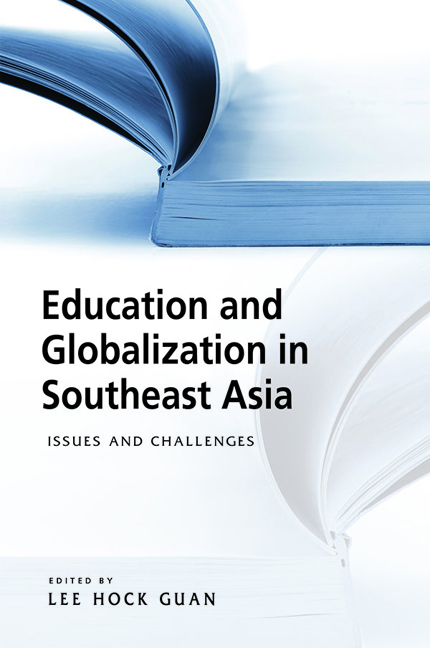Book contents
- Frontmatter
- Contents
- Acknowledgements
- Contributors
- Introduction
- 1 English in Singapore and Malaysia: Common Roots, Different Fruits
- 2 Globalization, Educational Language Policy and Nation-Building in Malaysia
- 3 Second-Order Change Without First-Order Change: A Case of Thai Internationalization of Higher Education
- 4 Higher Education in Malaysia: Access, Equity and Quality
- 5 Indonesian Higher Education: Gaps in Access and School Choice
- 6 Increasing Access to and Retention in Primary Education in Malaysia
- 7 Primary and Secondary Education in Myanmar: Challenges Facing Current Reforms
- Index
Introduction
Published online by Cambridge University Press: 12 January 2018
- Frontmatter
- Contents
- Acknowledgements
- Contributors
- Introduction
- 1 English in Singapore and Malaysia: Common Roots, Different Fruits
- 2 Globalization, Educational Language Policy and Nation-Building in Malaysia
- 3 Second-Order Change Without First-Order Change: A Case of Thai Internationalization of Higher Education
- 4 Higher Education in Malaysia: Access, Equity and Quality
- 5 Indonesian Higher Education: Gaps in Access and School Choice
- 6 Increasing Access to and Retention in Primary Education in Malaysia
- 7 Primary and Secondary Education in Myanmar: Challenges Facing Current Reforms
- Index
Summary
Since Southeast Asian countries attained political independence, they have created “national education systems … as part of the state forming process which established the modern nation state” (Green 1997, p. 170). Framed in the context of the nation-state, education was tasked with the overlapping objectives of state and nation-building and national economic development. All states in the region nationalized and monopolized education and founded largely public-funded centralized education systems to teach literacy through the medium of a national language — in the case of Singapore, an official language — and to create a shared national culture by using a common syllabus. In recent decades, however, globalization, which has profoundly transformed the economic, social, cultural and technological processes and structures throughout the world, has also impacted in varying ways and degrees the national education systems across the region. How Southeast Asian countries should reformulate and restructure their education systems and which strategy they ought to adopt to prepare to adapt and deal with globalization clearly depended on each country's societal make-up and economic situation and level of economic development.
How has globalization impacted and shaped the development of national education systems in Southeast Asia? In brief, globalization has brought about four interrelated changes to the education systems: (i) increasing demand for highly skilled and qualified labour; (ii) shifts in governance; (iii) privatization or commodification of education; and (iv) internationalization of education (Altbach and Knight 2007; Carnoy 2005; Robertson 2007). The emergent neo-liberal ideological paradigm accompanying globalization also dramatically altered the prevailing post-independent centralized governance and provision of education. In Southeast Asian states, in recent times the education sector has been subjected to varying degrees of decentralization and privatization or commodification. Moreover, the privatization of the region's education sector is occurring in the context of the growing internationalization of education, especially of higher education. Increasing global economic competitiveness and the emergence of the knowledge economy have raised the national, especially for more developed Southeast Asian economies, and international demand for tertiary-educated skilled and qualified personnel. While the scope, timing and pace of these transformations to the education systems differed in each Southeast Asian state, the main observable trend is the downscaling of state role in the governance and provision of education.
- Type
- Chapter
- Information
- Education and Globalization in Southeast AsiaIssues and Challenges, pp. 1 - 13Publisher: ISEAS–Yusof Ishak InstitutePrint publication year: 2017



